Critical Radical Social Work & Anti-Oppressive Theory: An Analysis
VerifiedAdded on 2023/06/10
|8
|2281
|225
Essay
AI Summary
This essay provides an analysis of Critical Radical Social Work Theory and Anti-Oppressive Theory, drawing upon various sources and perspectives within the field of social work. It explores the core tenets of critical social work, highlighting its strengths in challenging societal norms and promoting social justice, while also acknowledging its limitations, such as overemphasizing theoretical themes at the expense of practical considerations. The essay further examines anti-oppressive practice, a sub-theory of critical social work, focusing on its commitment to addressing socio-economic oppression. While recognizing the strengths of anti-oppressive practice in revealing ideological positions and targeting social injustice, the analysis also addresses its limitations, including the challenges of implementing it effectively at broader structural and societal levels. The essay concludes that both theories, despite their limitations, offer valuable tools for social workers seeking to uplift oppressed individuals and communities, provided they are implemented thoughtfully and strategically. Desklib provides a wide array of similar solved assignments for students.
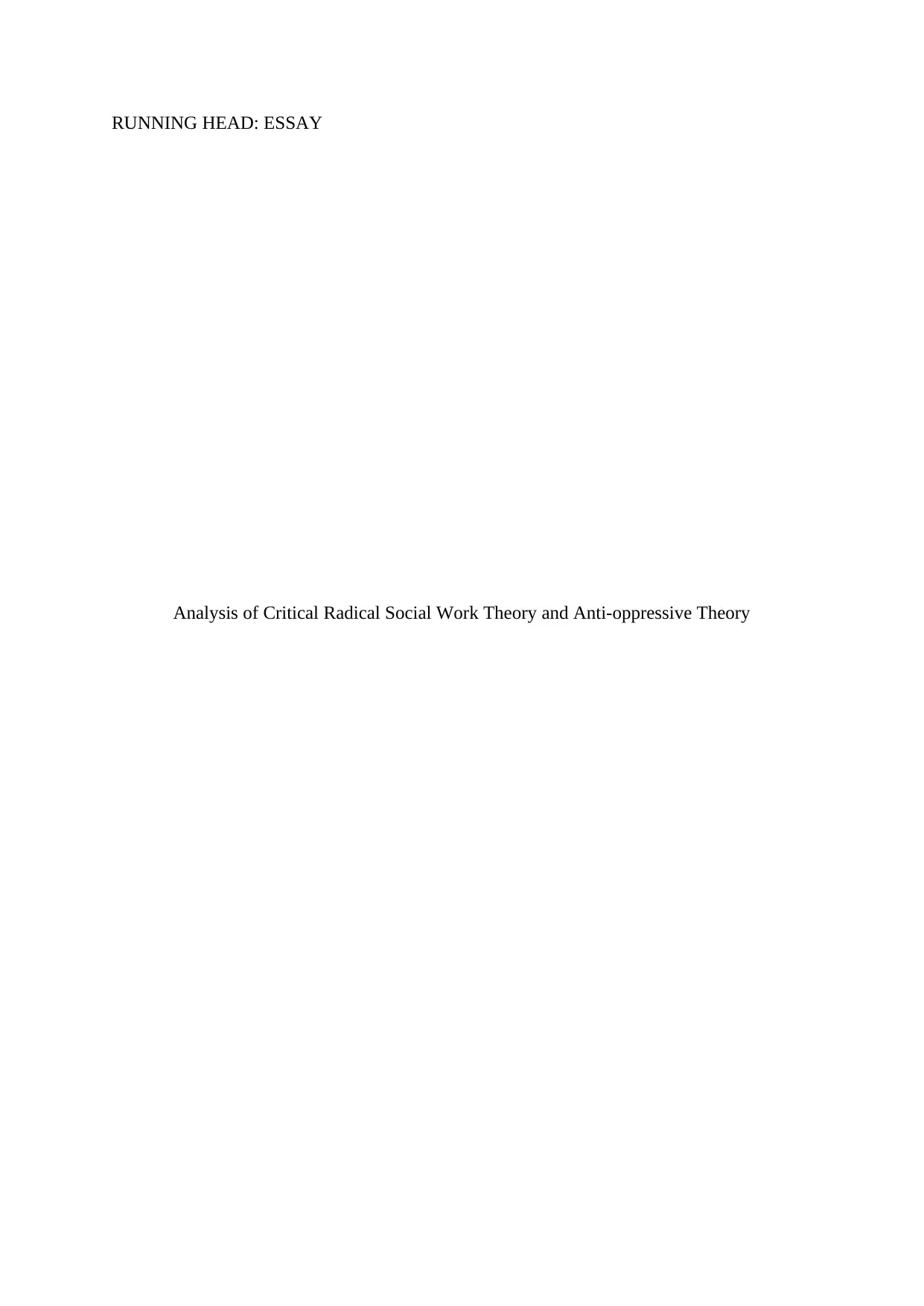
RUNNING HEAD: ESSAY
Analysis of Critical Radical Social Work Theory and Anti-oppressive Theory
Analysis of Critical Radical Social Work Theory and Anti-oppressive Theory
Paraphrase This Document
Need a fresh take? Get an instant paraphrase of this document with our AI Paraphraser
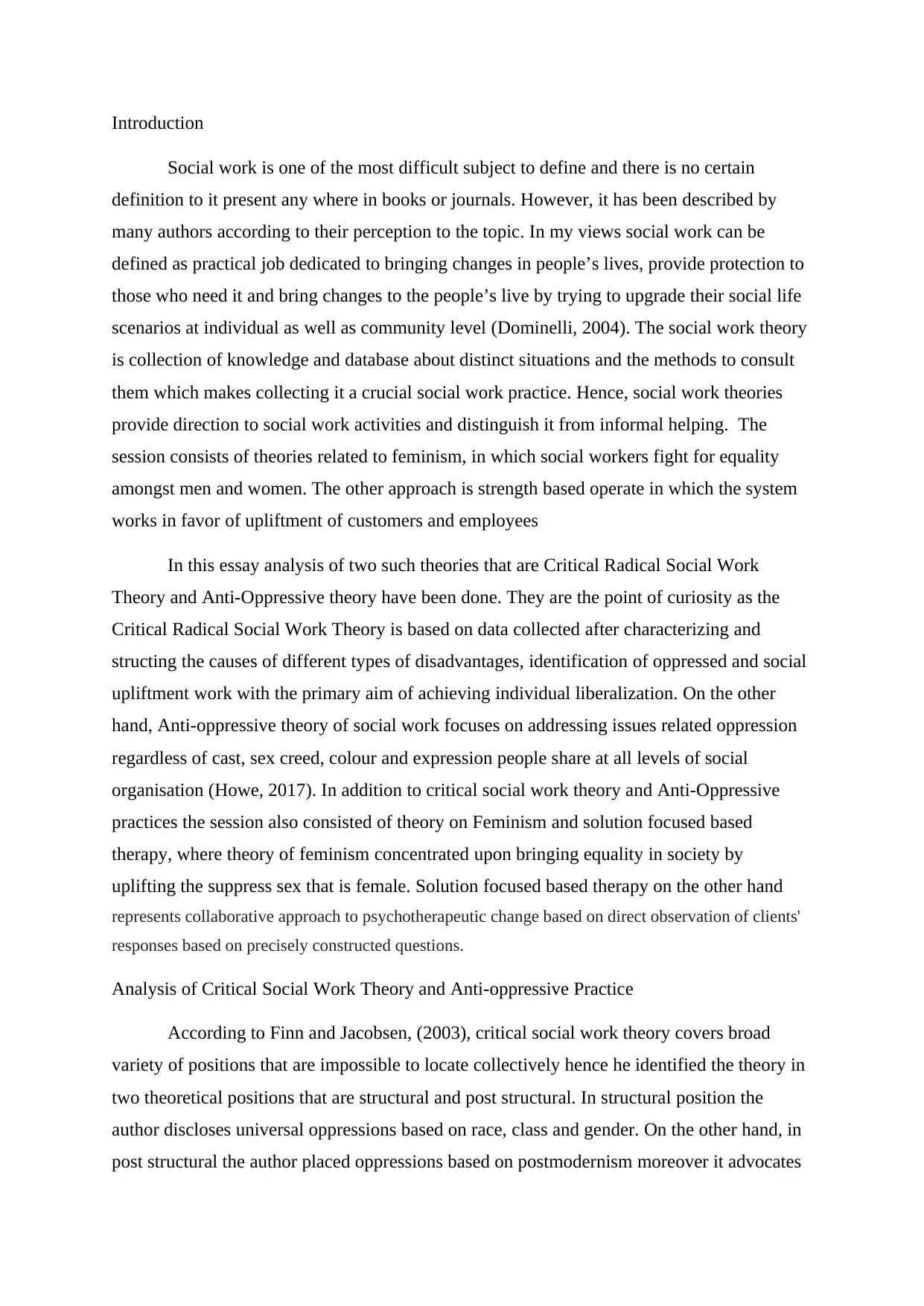
Introduction
Social work is one of the most difficult subject to define and there is no certain
definition to it present any where in books or journals. However, it has been described by
many authors according to their perception to the topic. In my views social work can be
defined as practical job dedicated to bringing changes in people’s lives, provide protection to
those who need it and bring changes to the people’s live by trying to upgrade their social life
scenarios at individual as well as community level (Dominelli, 2004). The social work theory
is collection of knowledge and database about distinct situations and the methods to consult
them which makes collecting it a crucial social work practice. Hence, social work theories
provide direction to social work activities and distinguish it from informal helping. The
session consists of theories related to feminism, in which social workers fight for equality
amongst men and women. The other approach is strength based operate in which the system
works in favor of upliftment of customers and employees
In this essay analysis of two such theories that are Critical Radical Social Work
Theory and Anti-Oppressive theory have been done. They are the point of curiosity as the
Critical Radical Social Work Theory is based on data collected after characterizing and
structing the causes of different types of disadvantages, identification of oppressed and social
upliftment work with the primary aim of achieving individual liberalization. On the other
hand, Anti-oppressive theory of social work focuses on addressing issues related oppression
regardless of cast, sex creed, colour and expression people share at all levels of social
organisation (Howe, 2017). In addition to critical social work theory and Anti-Oppressive
practices the session also consisted of theory on Feminism and solution focused based
therapy, where theory of feminism concentrated upon bringing equality in society by
uplifting the suppress sex that is female. Solution focused based therapy on the other hand
represents collaborative approach to psychotherapeutic change based on direct observation of clients'
responses based on precisely constructed questions.
Analysis of Critical Social Work Theory and Anti-oppressive Practice
According to Finn and Jacobsen, (2003), critical social work theory covers broad
variety of positions that are impossible to locate collectively hence he identified the theory in
two theoretical positions that are structural and post structural. In structural position the
author discloses universal oppressions based on race, class and gender. On the other hand, in
post structural the author placed oppressions based on postmodernism moreover it advocates
Social work is one of the most difficult subject to define and there is no certain
definition to it present any where in books or journals. However, it has been described by
many authors according to their perception to the topic. In my views social work can be
defined as practical job dedicated to bringing changes in people’s lives, provide protection to
those who need it and bring changes to the people’s live by trying to upgrade their social life
scenarios at individual as well as community level (Dominelli, 2004). The social work theory
is collection of knowledge and database about distinct situations and the methods to consult
them which makes collecting it a crucial social work practice. Hence, social work theories
provide direction to social work activities and distinguish it from informal helping. The
session consists of theories related to feminism, in which social workers fight for equality
amongst men and women. The other approach is strength based operate in which the system
works in favor of upliftment of customers and employees
In this essay analysis of two such theories that are Critical Radical Social Work
Theory and Anti-Oppressive theory have been done. They are the point of curiosity as the
Critical Radical Social Work Theory is based on data collected after characterizing and
structing the causes of different types of disadvantages, identification of oppressed and social
upliftment work with the primary aim of achieving individual liberalization. On the other
hand, Anti-oppressive theory of social work focuses on addressing issues related oppression
regardless of cast, sex creed, colour and expression people share at all levels of social
organisation (Howe, 2017). In addition to critical social work theory and Anti-Oppressive
practices the session also consisted of theory on Feminism and solution focused based
therapy, where theory of feminism concentrated upon bringing equality in society by
uplifting the suppress sex that is female. Solution focused based therapy on the other hand
represents collaborative approach to psychotherapeutic change based on direct observation of clients'
responses based on precisely constructed questions.
Analysis of Critical Social Work Theory and Anti-oppressive Practice
According to Finn and Jacobsen, (2003), critical social work theory covers broad
variety of positions that are impossible to locate collectively hence he identified the theory in
two theoretical positions that are structural and post structural. In structural position the
author discloses universal oppressions based on race, class and gender. On the other hand, in
post structural the author placed oppressions based on postmodernism moreover it advocates
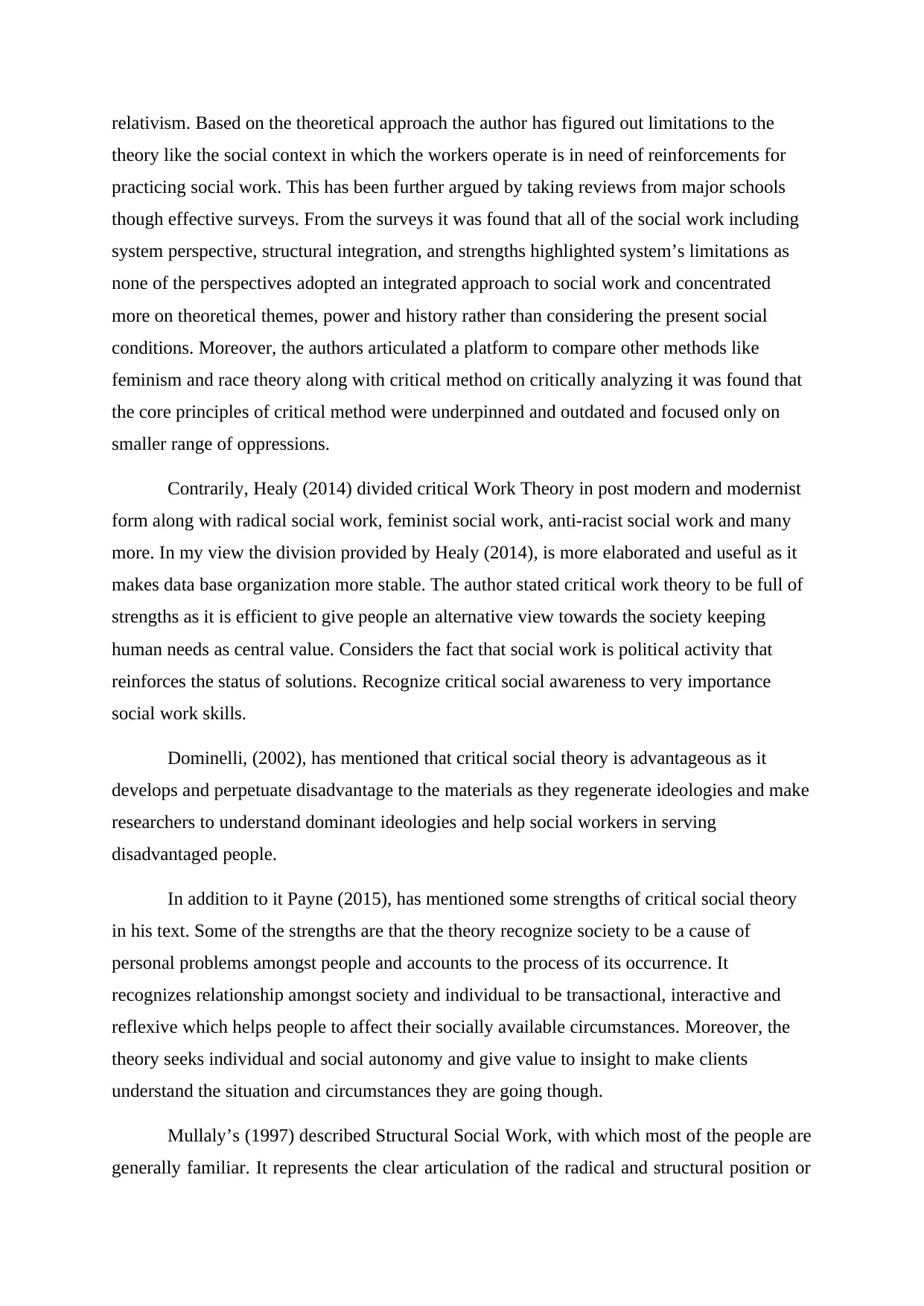
relativism. Based on the theoretical approach the author has figured out limitations to the
theory like the social context in which the workers operate is in need of reinforcements for
practicing social work. This has been further argued by taking reviews from major schools
though effective surveys. From the surveys it was found that all of the social work including
system perspective, structural integration, and strengths highlighted system’s limitations as
none of the perspectives adopted an integrated approach to social work and concentrated
more on theoretical themes, power and history rather than considering the present social
conditions. Moreover, the authors articulated a platform to compare other methods like
feminism and race theory along with critical method on critically analyzing it was found that
the core principles of critical method were underpinned and outdated and focused only on
smaller range of oppressions.
Contrarily, Healy (2014) divided critical Work Theory in post modern and modernist
form along with radical social work, feminist social work, anti-racist social work and many
more. In my view the division provided by Healy (2014), is more elaborated and useful as it
makes data base organization more stable. The author stated critical work theory to be full of
strengths as it is efficient to give people an alternative view towards the society keeping
human needs as central value. Considers the fact that social work is political activity that
reinforces the status of solutions. Recognize critical social awareness to very importance
social work skills.
Dominelli, (2002), has mentioned that critical social theory is advantageous as it
develops and perpetuate disadvantage to the materials as they regenerate ideologies and make
researchers to understand dominant ideologies and help social workers in serving
disadvantaged people.
In addition to it Payne (2015), has mentioned some strengths of critical social theory
in his text. Some of the strengths are that the theory recognize society to be a cause of
personal problems amongst people and accounts to the process of its occurrence. It
recognizes relationship amongst society and individual to be transactional, interactive and
reflexive which helps people to affect their socially available circumstances. Moreover, the
theory seeks individual and social autonomy and give value to insight to make clients
understand the situation and circumstances they are going though.
Mullaly’s (1997) described Structural Social Work, with which most of the people are
generally familiar. It represents the clear articulation of the radical and structural position or
theory like the social context in which the workers operate is in need of reinforcements for
practicing social work. This has been further argued by taking reviews from major schools
though effective surveys. From the surveys it was found that all of the social work including
system perspective, structural integration, and strengths highlighted system’s limitations as
none of the perspectives adopted an integrated approach to social work and concentrated
more on theoretical themes, power and history rather than considering the present social
conditions. Moreover, the authors articulated a platform to compare other methods like
feminism and race theory along with critical method on critically analyzing it was found that
the core principles of critical method were underpinned and outdated and focused only on
smaller range of oppressions.
Contrarily, Healy (2014) divided critical Work Theory in post modern and modernist
form along with radical social work, feminist social work, anti-racist social work and many
more. In my view the division provided by Healy (2014), is more elaborated and useful as it
makes data base organization more stable. The author stated critical work theory to be full of
strengths as it is efficient to give people an alternative view towards the society keeping
human needs as central value. Considers the fact that social work is political activity that
reinforces the status of solutions. Recognize critical social awareness to very importance
social work skills.
Dominelli, (2002), has mentioned that critical social theory is advantageous as it
develops and perpetuate disadvantage to the materials as they regenerate ideologies and make
researchers to understand dominant ideologies and help social workers in serving
disadvantaged people.
In addition to it Payne (2015), has mentioned some strengths of critical social theory
in his text. Some of the strengths are that the theory recognize society to be a cause of
personal problems amongst people and accounts to the process of its occurrence. It
recognizes relationship amongst society and individual to be transactional, interactive and
reflexive which helps people to affect their socially available circumstances. Moreover, the
theory seeks individual and social autonomy and give value to insight to make clients
understand the situation and circumstances they are going though.
Mullaly’s (1997) described Structural Social Work, with which most of the people are
generally familiar. It represents the clear articulation of the radical and structural position or
⊘ This is a preview!⊘
Do you want full access?
Subscribe today to unlock all pages.

Trusted by 1+ million students worldwide
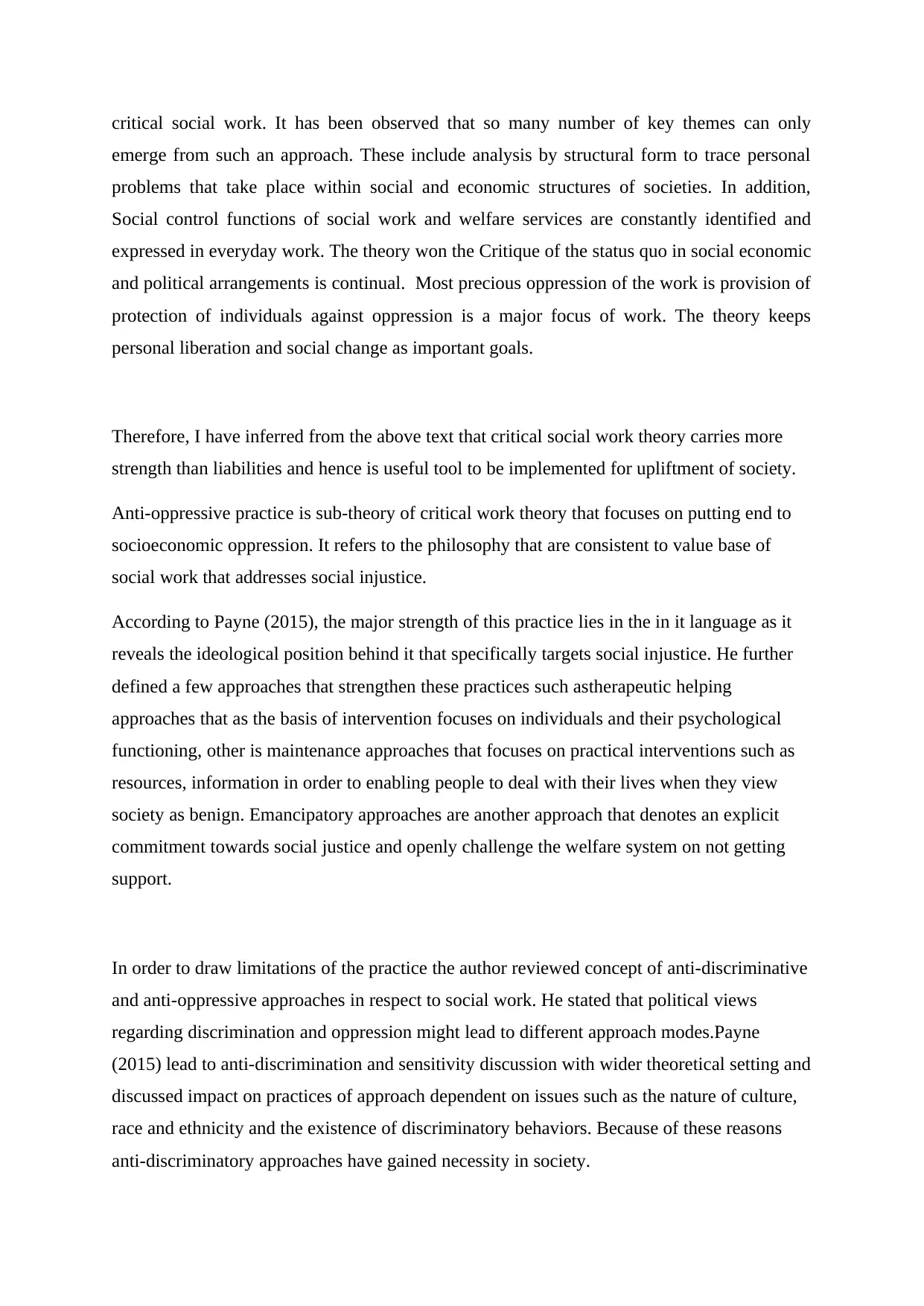
critical social work. It has been observed that so many number of key themes can only
emerge from such an approach. These include analysis by structural form to trace personal
problems that take place within social and economic structures of societies. In addition,
Social control functions of social work and welfare services are constantly identified and
expressed in everyday work. The theory won the Critique of the status quo in social economic
and political arrangements is continual. Most precious oppression of the work is provision of
protection of individuals against oppression is a major focus of work. The theory keeps
personal liberation and social change as important goals.
Therefore, I have inferred from the above text that critical social work theory carries more
strength than liabilities and hence is useful tool to be implemented for upliftment of society.
Anti-oppressive practice is sub-theory of critical work theory that focuses on putting end to
socioeconomic oppression. It refers to the philosophy that are consistent to value base of
social work that addresses social injustice.
According to Payne (2015), the major strength of this practice lies in the in it language as it
reveals the ideological position behind it that specifically targets social injustice. He further
defined a few approaches that strengthen these practices such astherapeutic helping
approaches that as the basis of intervention focuses on individuals and their psychological
functioning, other is maintenance approaches that focuses on practical interventions such as
resources, information in order to enabling people to deal with their lives when they view
society as benign. Emancipatory approaches are another approach that denotes an explicit
commitment towards social justice and openly challenge the welfare system on not getting
support.
In order to draw limitations of the practice the author reviewed concept of anti-discriminative
and anti-oppressive approaches in respect to social work. He stated that political views
regarding discrimination and oppression might lead to different approach modes.Payne
(2015) lead to anti-discrimination and sensitivity discussion with wider theoretical setting and
discussed impact on practices of approach dependent on issues such as the nature of culture,
race and ethnicity and the existence of discriminatory behaviors. Because of these reasons
anti-discriminatory approaches have gained necessity in society.
emerge from such an approach. These include analysis by structural form to trace personal
problems that take place within social and economic structures of societies. In addition,
Social control functions of social work and welfare services are constantly identified and
expressed in everyday work. The theory won the Critique of the status quo in social economic
and political arrangements is continual. Most precious oppression of the work is provision of
protection of individuals against oppression is a major focus of work. The theory keeps
personal liberation and social change as important goals.
Therefore, I have inferred from the above text that critical social work theory carries more
strength than liabilities and hence is useful tool to be implemented for upliftment of society.
Anti-oppressive practice is sub-theory of critical work theory that focuses on putting end to
socioeconomic oppression. It refers to the philosophy that are consistent to value base of
social work that addresses social injustice.
According to Payne (2015), the major strength of this practice lies in the in it language as it
reveals the ideological position behind it that specifically targets social injustice. He further
defined a few approaches that strengthen these practices such astherapeutic helping
approaches that as the basis of intervention focuses on individuals and their psychological
functioning, other is maintenance approaches that focuses on practical interventions such as
resources, information in order to enabling people to deal with their lives when they view
society as benign. Emancipatory approaches are another approach that denotes an explicit
commitment towards social justice and openly challenge the welfare system on not getting
support.
In order to draw limitations of the practice the author reviewed concept of anti-discriminative
and anti-oppressive approaches in respect to social work. He stated that political views
regarding discrimination and oppression might lead to different approach modes.Payne
(2015) lead to anti-discrimination and sensitivity discussion with wider theoretical setting and
discussed impact on practices of approach dependent on issues such as the nature of culture,
race and ethnicity and the existence of discriminatory behaviors. Because of these reasons
anti-discriminatory approaches have gained necessity in society.
Paraphrase This Document
Need a fresh take? Get an instant paraphrase of this document with our AI Paraphraser
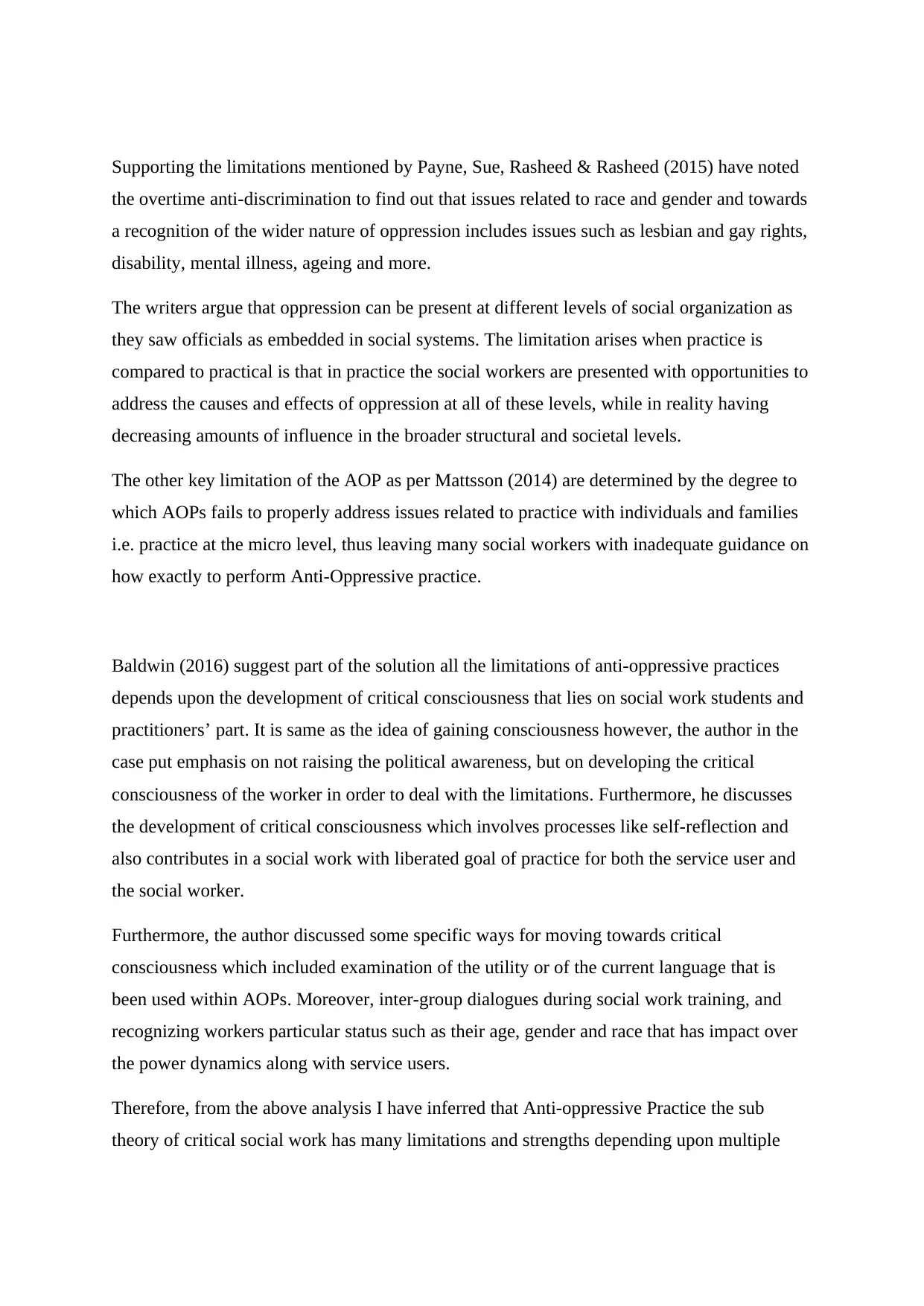
Supporting the limitations mentioned by Payne, Sue, Rasheed & Rasheed (2015) have noted
the overtime anti-discrimination to find out that issues related to race and gender and towards
a recognition of the wider nature of oppression includes issues such as lesbian and gay rights,
disability, mental illness, ageing and more.
The writers argue that oppression can be present at different levels of social organization as
they saw officials as embedded in social systems. The limitation arises when practice is
compared to practical is that in practice the social workers are presented with opportunities to
address the causes and effects of oppression at all of these levels, while in reality having
decreasing amounts of influence in the broader structural and societal levels.
The other key limitation of the AOP as per Mattsson (2014) are determined by the degree to
which AOPs fails to properly address issues related to practice with individuals and families
i.e. practice at the micro level, thus leaving many social workers with inadequate guidance on
how exactly to perform Anti-Oppressive practice.
Baldwin (2016) suggest part of the solution all the limitations of anti-oppressive practices
depends upon the development of critical consciousness that lies on social work students and
practitioners’ part. It is same as the idea of gaining consciousness however, the author in the
case put emphasis on not raising the political awareness, but on developing the critical
consciousness of the worker in order to deal with the limitations. Furthermore, he discusses
the development of critical consciousness which involves processes like self-reflection and
also contributes in a social work with liberated goal of practice for both the service user and
the social worker.
Furthermore, the author discussed some specific ways for moving towards critical
consciousness which included examination of the utility or of the current language that is
been used within AOPs. Moreover, inter-group dialogues during social work training, and
recognizing workers particular status such as their age, gender and race that has impact over
the power dynamics along with service users.
Therefore, from the above analysis I have inferred that Anti-oppressive Practice the sub
theory of critical social work has many limitations and strengths depending upon multiple
the overtime anti-discrimination to find out that issues related to race and gender and towards
a recognition of the wider nature of oppression includes issues such as lesbian and gay rights,
disability, mental illness, ageing and more.
The writers argue that oppression can be present at different levels of social organization as
they saw officials as embedded in social systems. The limitation arises when practice is
compared to practical is that in practice the social workers are presented with opportunities to
address the causes and effects of oppression at all of these levels, while in reality having
decreasing amounts of influence in the broader structural and societal levels.
The other key limitation of the AOP as per Mattsson (2014) are determined by the degree to
which AOPs fails to properly address issues related to practice with individuals and families
i.e. practice at the micro level, thus leaving many social workers with inadequate guidance on
how exactly to perform Anti-Oppressive practice.
Baldwin (2016) suggest part of the solution all the limitations of anti-oppressive practices
depends upon the development of critical consciousness that lies on social work students and
practitioners’ part. It is same as the idea of gaining consciousness however, the author in the
case put emphasis on not raising the political awareness, but on developing the critical
consciousness of the worker in order to deal with the limitations. Furthermore, he discusses
the development of critical consciousness which involves processes like self-reflection and
also contributes in a social work with liberated goal of practice for both the service user and
the social worker.
Furthermore, the author discussed some specific ways for moving towards critical
consciousness which included examination of the utility or of the current language that is
been used within AOPs. Moreover, inter-group dialogues during social work training, and
recognizing workers particular status such as their age, gender and race that has impact over
the power dynamics along with service users.
Therefore, from the above analysis I have inferred that Anti-oppressive Practice the sub
theory of critical social work has many limitations and strengths depending upon multiple
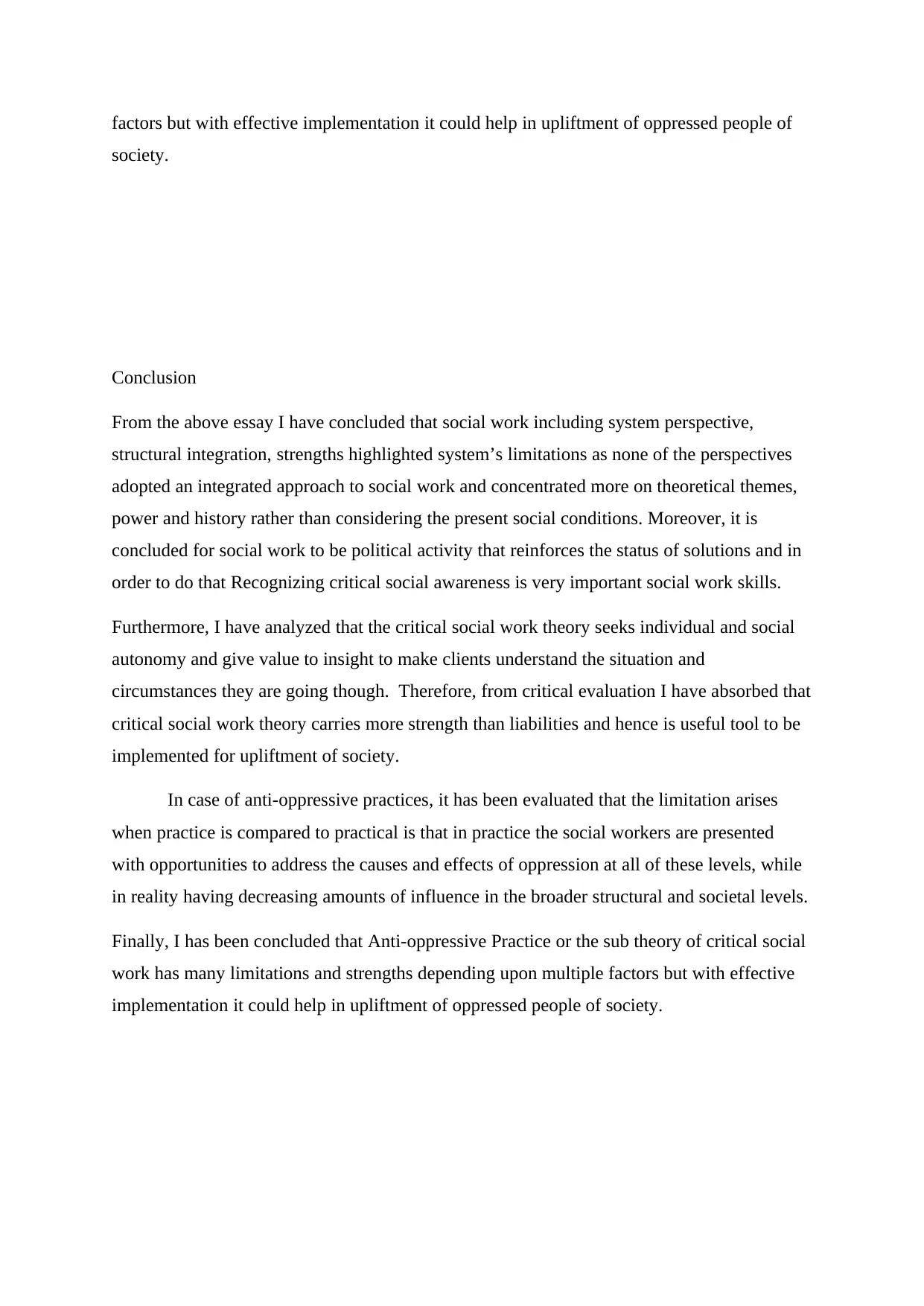
factors but with effective implementation it could help in upliftment of oppressed people of
society.
Conclusion
From the above essay I have concluded that social work including system perspective,
structural integration, strengths highlighted system’s limitations as none of the perspectives
adopted an integrated approach to social work and concentrated more on theoretical themes,
power and history rather than considering the present social conditions. Moreover, it is
concluded for social work to be political activity that reinforces the status of solutions and in
order to do that Recognizing critical social awareness is very important social work skills.
Furthermore, I have analyzed that the critical social work theory seeks individual and social
autonomy and give value to insight to make clients understand the situation and
circumstances they are going though. Therefore, from critical evaluation I have absorbed that
critical social work theory carries more strength than liabilities and hence is useful tool to be
implemented for upliftment of society.
In case of anti-oppressive practices, it has been evaluated that the limitation arises
when practice is compared to practical is that in practice the social workers are presented
with opportunities to address the causes and effects of oppression at all of these levels, while
in reality having decreasing amounts of influence in the broader structural and societal levels.
Finally, I has been concluded that Anti-oppressive Practice or the sub theory of critical social
work has many limitations and strengths depending upon multiple factors but with effective
implementation it could help in upliftment of oppressed people of society.
society.
Conclusion
From the above essay I have concluded that social work including system perspective,
structural integration, strengths highlighted system’s limitations as none of the perspectives
adopted an integrated approach to social work and concentrated more on theoretical themes,
power and history rather than considering the present social conditions. Moreover, it is
concluded for social work to be political activity that reinforces the status of solutions and in
order to do that Recognizing critical social awareness is very important social work skills.
Furthermore, I have analyzed that the critical social work theory seeks individual and social
autonomy and give value to insight to make clients understand the situation and
circumstances they are going though. Therefore, from critical evaluation I have absorbed that
critical social work theory carries more strength than liabilities and hence is useful tool to be
implemented for upliftment of society.
In case of anti-oppressive practices, it has been evaluated that the limitation arises
when practice is compared to practical is that in practice the social workers are presented
with opportunities to address the causes and effects of oppression at all of these levels, while
in reality having decreasing amounts of influence in the broader structural and societal levels.
Finally, I has been concluded that Anti-oppressive Practice or the sub theory of critical social
work has many limitations and strengths depending upon multiple factors but with effective
implementation it could help in upliftment of oppressed people of society.
⊘ This is a preview!⊘
Do you want full access?
Subscribe today to unlock all pages.

Trusted by 1+ million students worldwide
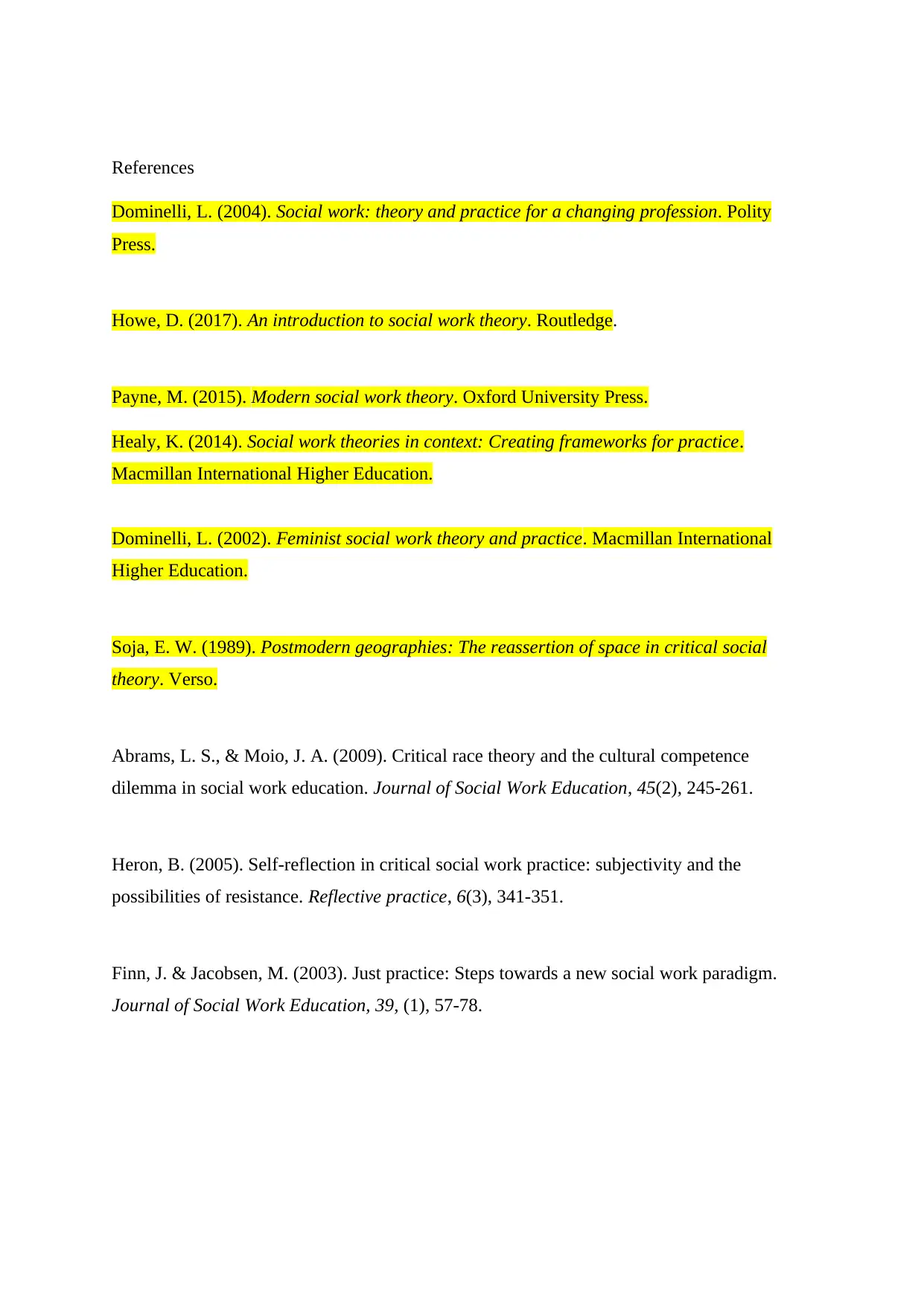
References
Dominelli, L. (2004). Social work: theory and practice for a changing profession. Polity
Press.
Howe, D. (2017). An introduction to social work theory. Routledge.
Payne, M. (2015). Modern social work theory. Oxford University Press.
Healy, K. (2014). Social work theories in context: Creating frameworks for practice.
Macmillan International Higher Education.
Dominelli, L. (2002). Feminist social work theory and practice. Macmillan International
Higher Education.
Soja, E. W. (1989). Postmodern geographies: The reassertion of space in critical social
theory. Verso.
Abrams, L. S., & Moio, J. A. (2009). Critical race theory and the cultural competence
dilemma in social work education. Journal of Social Work Education, 45(2), 245-261.
Heron, B. (2005). Self‐reflection in critical social work practice: subjectivity and the
possibilities of resistance. Reflective practice, 6(3), 341-351.
Finn, J. & Jacobsen, M. (2003). Just practice: Steps towards a new social work paradigm.
Journal of Social Work Education, 39, (1), 57-78.
Dominelli, L. (2004). Social work: theory and practice for a changing profession. Polity
Press.
Howe, D. (2017). An introduction to social work theory. Routledge.
Payne, M. (2015). Modern social work theory. Oxford University Press.
Healy, K. (2014). Social work theories in context: Creating frameworks for practice.
Macmillan International Higher Education.
Dominelli, L. (2002). Feminist social work theory and practice. Macmillan International
Higher Education.
Soja, E. W. (1989). Postmodern geographies: The reassertion of space in critical social
theory. Verso.
Abrams, L. S., & Moio, J. A. (2009). Critical race theory and the cultural competence
dilemma in social work education. Journal of Social Work Education, 45(2), 245-261.
Heron, B. (2005). Self‐reflection in critical social work practice: subjectivity and the
possibilities of resistance. Reflective practice, 6(3), 341-351.
Finn, J. & Jacobsen, M. (2003). Just practice: Steps towards a new social work paradigm.
Journal of Social Work Education, 39, (1), 57-78.
Paraphrase This Document
Need a fresh take? Get an instant paraphrase of this document with our AI Paraphraser
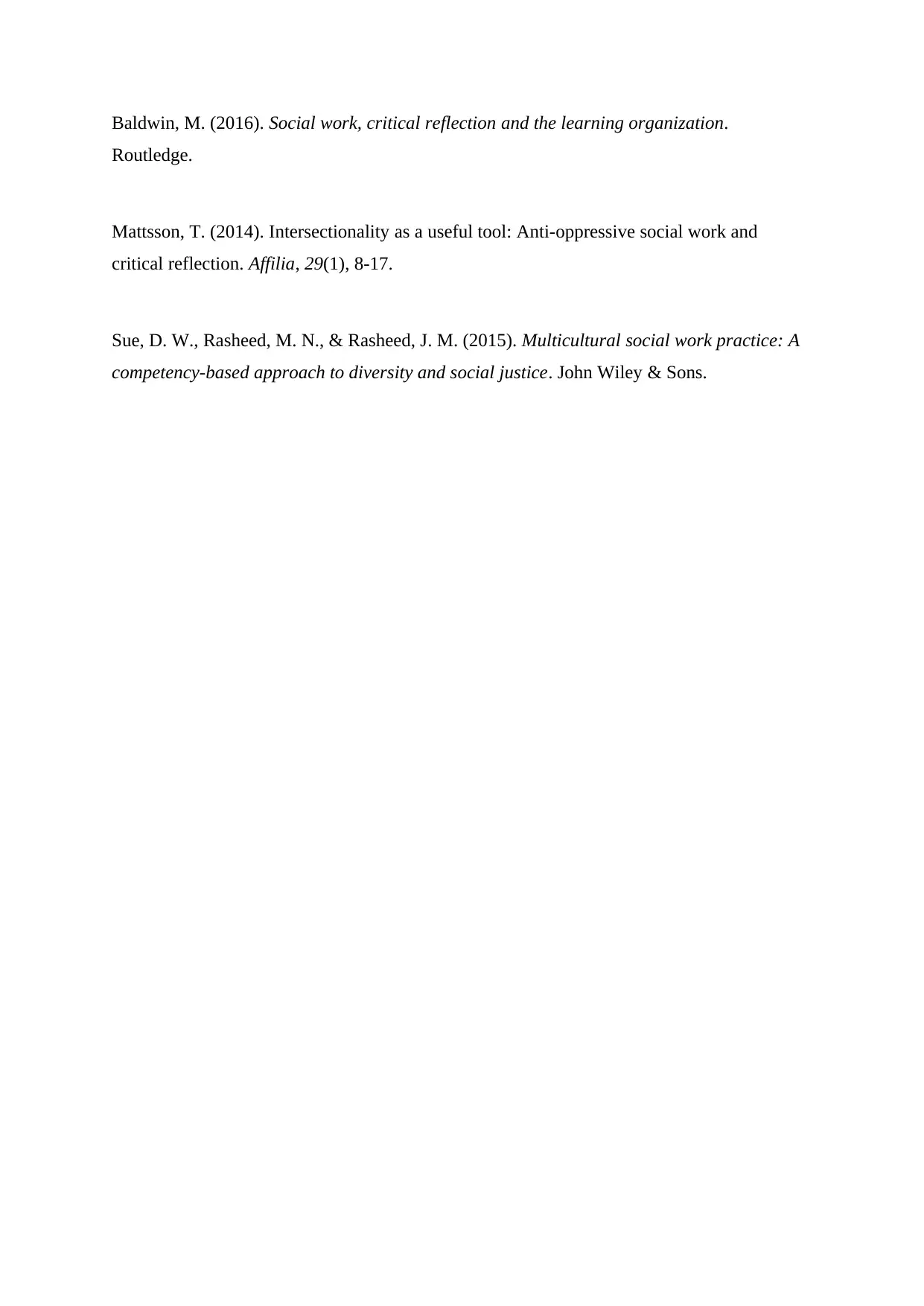
Baldwin, M. (2016). Social work, critical reflection and the learning organization.
Routledge.
Mattsson, T. (2014). Intersectionality as a useful tool: Anti-oppressive social work and
critical reflection. Affilia, 29(1), 8-17.
Sue, D. W., Rasheed, M. N., & Rasheed, J. M. (2015). Multicultural social work practice: A
competency-based approach to diversity and social justice. John Wiley & Sons.
Routledge.
Mattsson, T. (2014). Intersectionality as a useful tool: Anti-oppressive social work and
critical reflection. Affilia, 29(1), 8-17.
Sue, D. W., Rasheed, M. N., & Rasheed, J. M. (2015). Multicultural social work practice: A
competency-based approach to diversity and social justice. John Wiley & Sons.
1 out of 8
Related Documents
Your All-in-One AI-Powered Toolkit for Academic Success.
+13062052269
info@desklib.com
Available 24*7 on WhatsApp / Email
![[object Object]](/_next/static/media/star-bottom.7253800d.svg)
Unlock your academic potential
Copyright © 2020–2025 A2Z Services. All Rights Reserved. Developed and managed by ZUCOL.





